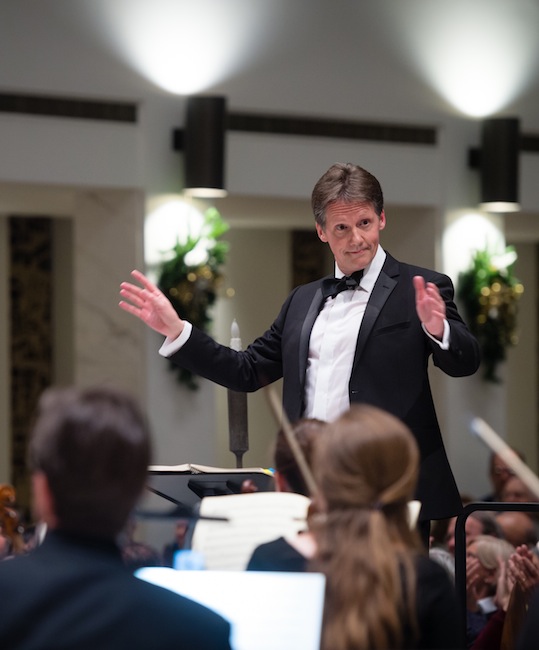Washington Bach Consort marks the season with a worthy “Christmas Oratorio”

Dana Marsh conducted the Washington Bach Consort in the Christmas Oratorio Sunday. File photo: David Betts
Conductor Dana Marsh is making Bach’s Christmas Oratorio the signature work of his tenure with the Washington Bach Consort. He led a partial performance of the work for his audition concert in 2017, and he returned to it Sunday afternoon at National Presbyterian Church. Now in his second year as music director, Marsh plans to make a December performance of this set of six cantatas an annual tradition, the German version of a Christmas-tide Messiah.
Well, almost six cantatas: the ensemble performed all but Part III of the Christmas Oratorio this time, one cantata more (Part IV) than their 2017 concert. Marsh’s impact on the sound of the Bach Consort continues to come into focus. The chorus’s ensemble blend seemed less transparent, that hallmark sound under founder J. Reilly Lewis that allowed Bach’s intricately layered parts to be heard so clearly.
All four sections sang with greater force, making for a denser, more muscular approach to the big choral numbers. Uncharacteristically, individual voices obtruded occasionally from the ensemble, particularly at the top end of the soprano and tenor ranges. Still, Marsh’s forces were at their best in some of these pieces, like the opening chorus “Jauchzet, frohlocket,” a crisp ensemble with festive trumpets and timpani in brilliant alignment.
Marsh had two of the same soloists as 2017, and bass Steven Combs gave the most impressive performance of the quartet. He was composed and authoritative in “Er ist auf Erden,” Bach’s ingenious combination of the bass’s commenting recitatives and the soprano section’s calmly phrased chorale. In his arias Combs deployed lustrous legato phrasing and ideal vocal placement at the top of the range especially, as in “Erleut auch meine finstre Sinnen” in Part V, matched by a sterling oboe d’amore obbligato.
Mezzo-soprano Kristen Dubenion-Smith also reprised her turn on the alto solos. Her warm chest voice is ideally suited to the lullaby “Schlafe, mein Liebster” in Part II, but she struggled to maintain a placid sound pitted against an orchestra that was more forceful than soothing. She was not at her best when Bach took her higher in her range either, as in the overly fast “Bereite dich, Zion” in Part I, another indication that this was an off day for her.
Elijah McCormack, a male soprano, sang with clean intonation and a clear tone, almost free of vibrato. This made him a striking Angel in Part II, and he knocked the echo aria “Flößt, mein Heiland” in Part IV out of the park, answered by soprano Laura Choi Stuart and an outstanding oboe solo by Geoffrey Burgess. Toward the end of the performance, McCormack’s intonation started to stray sharp at the top, which became too heavy, for example, in Part VI’s “Nur ein Wink.”
Tenor Rufus Müller intoned the Evangelist’s recitatives with excellent diction and authority, although the tone leaned toward leathery and shouted. Around high A the top became unreliable, especially when those notes popped up without much preparation. Running passages were not in particularly good shape either, as in “Frohe Hirten, eilt” in Part II, while Colin St-Martin’s contribution on that aria’s flute solo was flawless.
The orchestra sounded robust, especially the quartet of rough-hewn oboes d’amore and oboes da caccia in the shepherds’ sinfonia at the start of Part II. It is such a rustic, almost odorous sound, emblematic of people who slept in fields by their animals. The charming natural horns and trumpets had issues of intonation and accuracy, including a false start by one of the horns at the opening of the first chorus of Part IV, “Fallt mit Danken.”
For his part Marsh had a more confident hand with his musicians than on previous occasions, moving them assertively to conform to his tempo. In some cases, that insistent pacing was too frenetic, as in the harried sixteenth notes of “Ehre sei Gott,” the opening chorus of Part V. Adding the excellent bassoonist Anna Marsh to the continuo part was a good decision, helping to reinforce a strong foundation on which to build a larger ensemble sound.
Washington Bach Consort’s main series of concerts finishes the season at other venues, while National Presbyterian Church undergoes a renovation. They will perform the St. John Passion March 21 and 22. bachconsort.org
